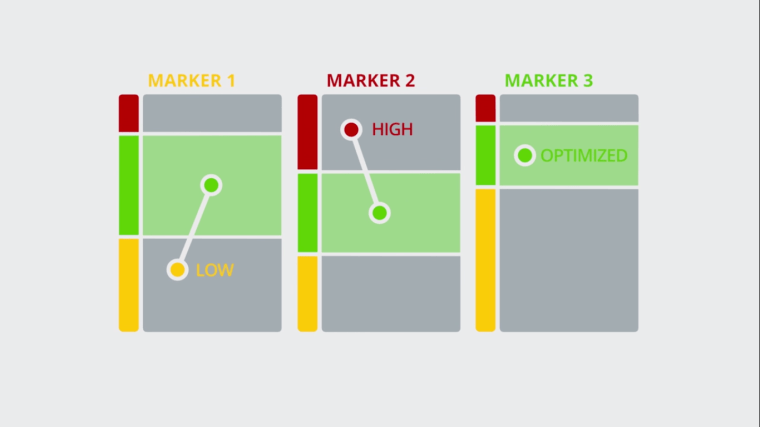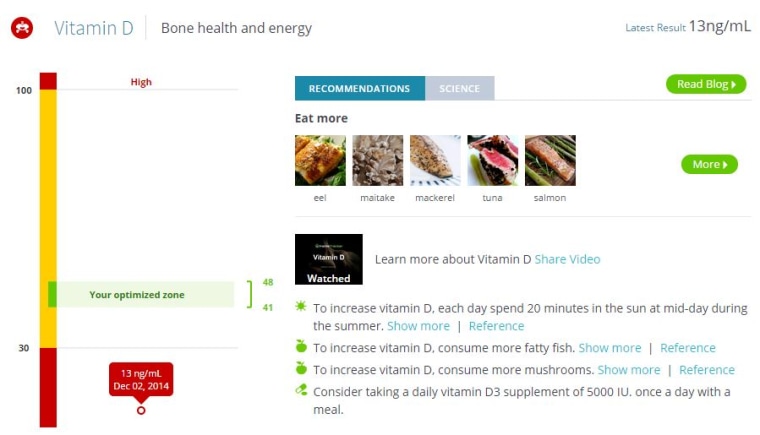If I’m truly young at heart, InnerAge should tell me. Not in the Frank Sinatra sense. I mean literally – the program looks at biomarkers in the blood to provide a “biological age” in contrast to someone’s chronological age.
It’s supposed to be a marker of longevity. For $99 per test, you get a sneak preview of your own inevitable decay. As I had my blood drawn, I envisioned Rob Lowe levels of age-defying good news.
Yeah, I had a slight cold at the time, but surely the test would see beyond that. What I did not expect was for the test to tell me I was 24 years older than I really am.
I just turned 33 years old. When I clicked on my results a few weeks after taking the test, this is what I saw:
57.
That is literally the worst result out of the hundred or so people who tested the product for InsideTracker, the Massachusetts-based company behind InnerAge. Biologically speaking, I should be able to apply for Social Security in less than a decade.
“It was definitely influenced by you being sick,” Dr. Gil Blander, founder and chief scientific officer of InsideTracker, told me on the phone. "You need to understand, InnerAge is a tool that is giving you the big picture. It's not saying you are 57 all the time."
Here are the five factors that influence InnerAge: glucose, vitamin D, testosterone, hsCRP and ALT. The last two are an inflammation indicator and a liver damage indicator, respectively.
I'm a relatively healthy looking individual. I don't mountain-climb with a fanny pack full of kale, as I assume all healthy people do, but I do go to the gym a couple of times a week. I have been known to eat a vegetable. I'm not entirely opposed to sunlight.
Sniffles or no sniffles, surely I can't be 24 years older than my actual age? (Most of the time, people first register at around three to four years older, the company told me).

I decided to get a second opinion.
"Of course there is an intimate link between health and longevity," Dr. Judith Campisi, a professor at the Buck Institute for Research on Aging, told me. "But to claim that these measures of health are a predictor or a reflection of your longevity potential ... there is no evidence of that."
There are a lot of older people with vitamin D deficiencies, she said, but loading up on it now doesn't mean you will live longer. High glucose levels are bad, but usually because they are associated with type 2 diabetes. (Being sick can cause them to shoot up).
What about a third opinion?
None of the things highlighted by InnerAge can't be measured by a normal doctor, according to Dr. Gary Small, director of the UCLA Longevity Center. He said InsideTracker's scientists might have special insight, but that it wasn't common knowledge in the gerontology field that these are the five most important factors that influence longevity.
Focusing on them and ignoring something like cholesterol, he said, is a bad idea. Not that you shouldn't try a program like InnerAge. But it's important not to get too wrapped up in new, relatively untested technology.
"If you're concerned about your health, go to your doctor before you embark on any kind of online program," he said.
The point of InnerAge is not to send writers into existential tailspins. Instead, the tool is supposed to be like an online check-up, with specific nutrition advice to help you boost whatever is keeping you from realizing your ideal InnerAge.

Here is a look at my vitamin D levels -- not a surprise, since it's winter and my favorite activity is reading until I fall asleep. The report includes videos that tell me why I need vitamin D, food recommendations to boost my vitamin D levels and links to video recipes.
"It's a tool you should follow-up with every few months," Blander said. "It's very similar to regularly taking your car into the technician."
The age in InnerAge is about giving someone a simple number to focus on, he said. That way, instead of worrying about a complicated blood test, they have a single number to reduce through diet and exercise.
Overall, my second and third opinions were all for eating a healthier diet and exercising more. Campisi worried about the test creating anxiety for people with low levels of things that aren't always a matter of diet and lifestyle.
"Let's say you have high hsCRP," she said. "What are you supposed to do about it?"
Inflammation and testosterone can be hard to alter with diet, she said, adding that it's not even proven that they are the most important factors when it comes to longevity.
Still, it wouldn't hurt me to eat better and spend a little more time outdoors. Besides, I'm a fan of mackerel, white beans and oatmeal, all things my test says I should be eating.
The youngest my InnerAge scale goes down to is 22. With some work over the next few months, maybe I'll be barely above drinking age instead of nearing retirement.
Keith Wagstaff writes about technology for NBC News. He previously covered technology for TIME's Techland and wrote about politics as a staff writer at TheWeek.com. You can follow him on Twitter at @kwagstaff and reach him by email at: Keith.Wagstaff@nbcuni.com